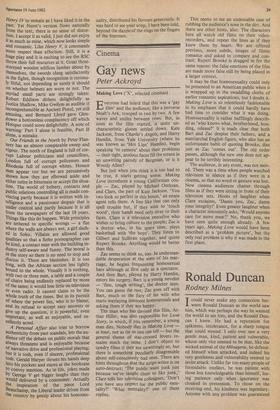Cinema
Gay news
Peter Ackroyd
Making Love ('X', selected cinemas) Everyone had heard that this was a 'gay film' and the audience, like a perverse Noah's Ark, trooped in two by two. A few waves and smiles between rows. But, as soon as the film started, a quite un- characteristic gloom settled down. Kate Jackson, from Charlie's Angels, and Harry Hamlin, from Yale University (where he was known as 'Hot Lips' Hamlin), begin speaking `to camera' about their problems — their tight, anxious faces fill the screen in an unwitting parody of Bergman, or is it Woody Allen?
But just when you think it is too bad to be true, it starts getting worse. Making Love introduces a young Californian cou- ple — Zac, played by Michael Ontkean, and Clare, the part of Kate Jackson. 'You two look so perfect in this house,' an estate agent tells them. A line like that can only spell trouble but, if they wish to 'touch wood', their hands need only stray to their faces. Clare is a television executive who wishes to bring culture to the people; Zac is a doctor who, in his spare time, plays basketball with 'the boys'. They listen to Gilbert and Sullivan together, and quote Rupert Brooke. Anything would be better than this.
Zac seems to think so, too. In understan- dable desperation at the state of his mar- riage, he begins frequenting homosexual bars although at first only as a spectator. And then Bart, played by Harry Hamlin, enters his surgery. Bart is a young novelist — 'fine, tough writing', the doctor says. You can guess the rest: Zac goes off with Bart, much to the fury of his wife who starts waylaying innocent homosexuals and asking them if they are happy. The man who has devised this film, Ar- thur Hiller, was also responsible for Love Story, in which, if you remember, a young man dies. Nobody dies in Making Love at least, not as far as one can tell — but the general theme of star-crossed lovers re- mains much the same. I don't object to tawdry films if they are unwittingly so, but there is something peculiarly disagreeable about self-consciously bad ones. There are hints throughout that the script-writer is on auto-destruct: 'The public want junk just because we've taught them to like junk,' Clare tells her television colleagues, 'Don't you have any respect for the public men- tality?' What mentality?' one of them replies. This seems to me an undeniable case of rubbing the audience's nose in the dirt. And there are other hints, also. The characters here all watch old films on their video- recorders, and repeat the lines as if they knew them by heart. We are offered previous, more subtle, images of filmic romance and' asked to compare and con- trast; Rupert Brooke is dragged in for the same reason: the false emotions of the film are made more false still by being placed in a larger context.
It may be that homosexuality could only be presented to an American public when it is wrapped up in the swaddling cloths of earlier romantic aspirations, but I doubt it. Making Love is so relentlessly fashionable in its emphases that it could hardly have had time to consider what it was doing. Homosexuality is rather bafflingly describ- ed as 'who knows what, brotherhood, bon- ding, release?' It is made clear that both Bart and Zac despise their fathers, and a matriarchal English figure, who also has an unfortunate habit of quoting Brooke, dies just as Zac 'comes out'. The old order passes, although the new one does not ap- pear to be terribly interesting.
The audience, in any event, was not mov- ed. There was a time when people watched television in silence as if they were in a cinema, so that no word or gesture was lost. Now cinema audiences chatter through films as if they were sitting in front of their television sets. Hoots of laughter when Clare exclaims, 'Damn you, Zac, damn your integrity!' Even greater laughter when a character innocently asks, 'Would anyone care for more meat?' No, thank you, we have seen quite enough already. A few years ago, Making Love would have been described as a 'problem picture', but the only real problem is why it was made in the first place.




































 Previous page
Previous page